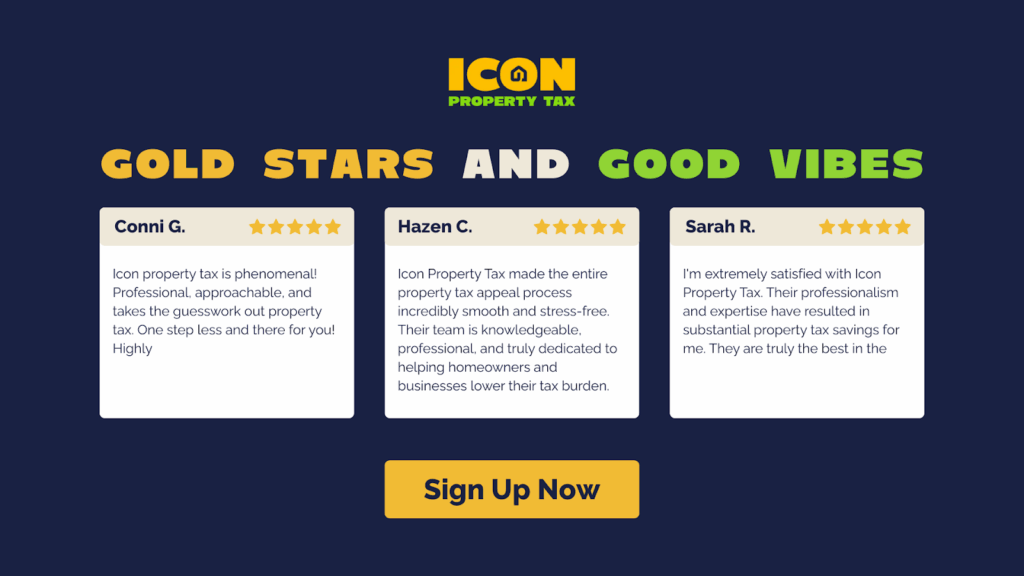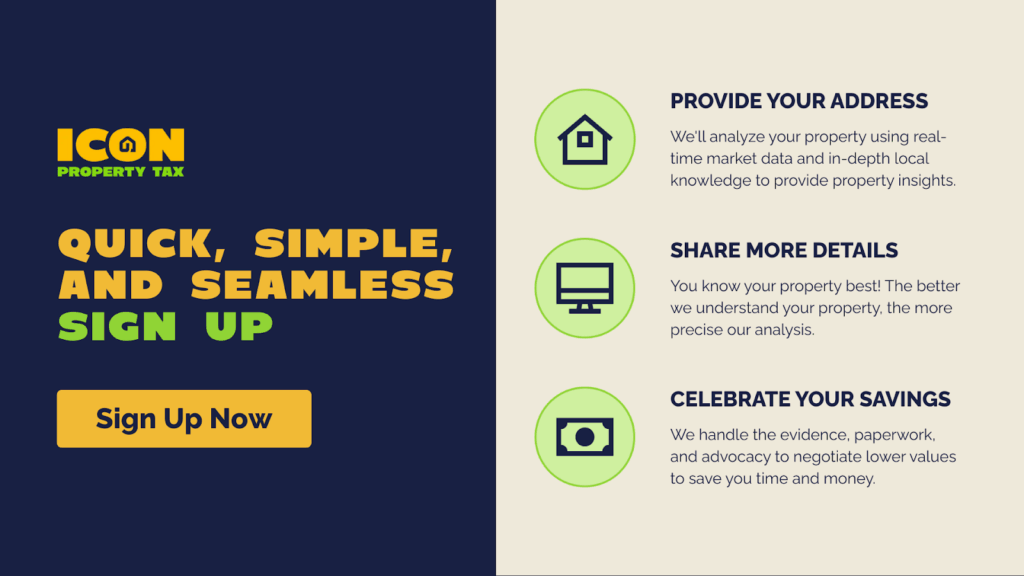What To Expect When The Appraisal Exceeds Your Offer
August 11, 2025
Key Takeaways:
- Instant Equity: A higher appraisal than your offer can result in immediate equity, benefiting you financially when refinancing or selling later.
- Tax Implications: The appraised value may influence your property tax assessment, even if you paid less for the home.
- Protest Opportunity: You can challenge inflated assessments, and Icon offers expert help with no upfront cost if you’re being overtaxed.
It’s not uncommon for buyers to be caught off guard when their home is appraised for more than what they offered, especially in markets where negotiation, seller motivation, or home condition play a role. At the same time, it might seem like a positive outcome at first glance, a higher appraisal number can open the door to consequences that aren’t immediately obvious, particularly regarding long-term tax implications. Knowing what this means and how to respond can save you thousands.
At Icon, we’ve helped thousands of property owners nationwide reduce their tax burden without the stress, upfront fees, or complicated processes. As one of the most trusted names in the property tax industry, we know how to challenge inflated values, navigate appraisal disputes, and help homeowners keep more of their earnings. Our track record speaks for itself, and our no-savings, no-fee pledge keeps us fully aligned with your interests from day one.
In this piece, we’ll break down what happens when the appraisal exceeds your offer, and what you can do to make sure it doesn’t cost you more in the long run.
Understanding Appraisals And Offers
When you’re buying a home, two numbers often come into play: the amount you offer and the appraised value of the property. While you might think they should match, that’s rarely the case.
An appraisal is a professional estimate of a property’s market value, typically required by lenders to justify the loan amount. On the other hand, the offer is what a buyer is willing to pay, based on various factors like competition, budget, or emotional attachment.
Sometimes, the appraisal comes in higher than your offer, and while that might sound like great news, it can raise questions about how this impacts your purchase, taxes, and financial planning.
Knowing how to navigate this situation is essential for protecting your investment and understanding the potential tax implications.

Why An Appraisal Might Be Higher Than Your Offer
There are several reasons why a property’s appraisal might exceed the amount you offered, and most of them come down to market dynamics and how appraisers determine value.
Shifting Market Conditions
Appraisers rely heavily on recent comparable sales to assess a home’s value. If the market is heating up and home prices are rising quickly, your offer may lag what similar properties have recently sold for, resulting in a higher appraisal.
Conservative Bidding Strategy
Buyers often make offers below the asking price to negotiate a better deal. In such cases, the appraisal may reflect the actual market value of the home, even if your offer was more cautious or strategic.
Property Improvements Or Features
If the property has undergone renovations, added square footage, or includes features like energy-efficient systems or premium materials, those can drive up the appraised value. You may not have factored all of these into your offer, especially if they weren’t highlighted in the listing.
Motivated Sellers
Due to relocation, financial reasons, or other personal circumstances, a seller in a hurry may accept a lower offer just to close quickly. That doesn’t change the property’s actual value, which the appraiser still evaluates based on objective criteria.
What Happens Next: Key Scenarios To Know
When the appraisal comes in higher than your offer, it may seem like you’re getting a deal, and in some ways, you are. But it’s essential to understand the possible outcomes that follow, both immediately and down the line.
You Still Pay The Offer Price
Even though the appraised value is higher, you must only pay what you agreed upon in your purchase contract. This means you’re essentially walking into the home with instant equity, a financial advantage that could be beneficial if you refinance or sell later.
The Lender Is Typically Unaffected
Mortgage lenders base their financing on the lower purchase price or the appraised value. So in this case, your loan terms won’t change, and you won’t suddenly qualify for more financing just because the home is worth more.
Your Property Tax Assessment May Be Affected
This is where things can get tricky. A higher appraisal may influence your local tax assessor’s valuation of the home, which could lead to higher property taxes, even though you paid less for it.
Future Buyers Might Use That Appraisal As A Benchmark
If you sell the property later, prospective buyers (and their lenders) may refer back to the previous appraisal. That can impact negotiations or expectations, especially if market conditions shift.
The key is knowing how to leverage that value and when to challenge it if it unnecessarily increases your tax burden. Lower your tax burden and protect your investment with a no-obligation consultation from Icon.

How This Affects Your Property Taxes
When your appraisal is higher than your offer, your purchase price doesn’t always shield you from potential increases in property taxes. That’s because tax assessments don’t rely solely on what you paid; they consider the home’s assessed value, which can be influenced by the appraised value.
Local Appraisal Districts May Take Notice
In many states, appraisal districts monitor sales data and appraisals to adjust property tax valuations. If your home’s appraisal shows a value above what you paid, it might be flagged for reassessment, potentially leading to a higher property tax bill.
The Tax Burden May Not Reflect Your Actual Costs
Paying less than market value doesn’t guarantee lower taxes. When a home is appraised for more, the taxing authority may see that higher figure as a more accurate indicator of value, leaving you to pay taxes based on what the property is worth, not what you spent.
You’re Not Stuck With The Higher Assessment
The good news? You have the right to protest your property tax assessment. And that’s where working with a trusted team like Icon can help you push back and fight for a fair valuation. No savings, no fee, simple as that.
What You Can Do About It
If your appraisal is higher than your offer, you’re not powerless, especially regarding your property taxes. Taking the proper steps early can help you avoid overpaying in the years ahead.
File A Property Tax Protest
One of the most effective moves you can make is to file a protest with your local appraisal district. Just because the appraisal came in high doesn’t mean your assessed value should automatically rise, especially if that valuation doesn’t reflect your actual purchase price or the property’s condition.
Gather Supporting Evidence
Documentation matters. Arm yourself with comparable sales, your signed purchase agreement, and any photos or reports showing the home’s actual state at the time of purchase. These details can make a compelling case for a lower assessed value.
Partner With A Property Tax Expert
Tax appeals can be time-consuming and confusing, and one mistake can cost you. That’s why many homeowners turn to professionals like Icon. With our Zero Upfront Cost pledge, you pay only if you save. We handle the process and work to reduce your tax burden while you focus on settling into your home.
Why Working With Property Tax Experts Matters
Most homeowners are not prepared to navigate the property tax system, especially when unexpected appraisal values come into play. That’s where expert help becomes useful but essential.
You Gain Industry Knowledge And Local Insight
Tax professionals understand the nuances of your local appraisal district and how it calculates value. They know what evidence carries weight and how to build a case that gets results, especially when your home was appraised for more than you paid.
You Save Time, Stress, And Potentially Thousands
Protesting your property taxes is a time-sensitive process with strict deadlines and technical details. When you work with a team like Icon, you’re not just outsourcing paperwork; you’re investing in a proactive defense of your wallet. Our No-savings, No-fee Pledge means you have nothing to lose and plenty to gain.

Final Thought
A higher appraisal than your offer might feel like a financial bonus, and in some ways, it is. But it can also come with hidden costs, especially regarding property taxes.
The key is being proactive. Understand what the numbers mean, how they could impact your long-term expenses, and most importantly, what you can do to control them. If your property’s assessed value doesn’t reflect what you paid or its actual condition, you can challenge it.
At Icon, we make that process easier. With our No Savings, No Fee approach, you get expert support without upfront costs and only pay if we lower your tax burden.
Protect your investment. Keep more of your money. Let Icon help you do both.
Read Also:
- DuPage County Property Tax Overview: Rates, Assessments, and Billing Cycles
- Kane County Property Tax Overview: Rates, Assessments, And Billing Cycles
- Will County Property Tax Overview: Rates, Assessments, And Billing Cycles
Frequently Asked Questions About What If Appraisal Is Higher Than Offer
Is it possible for the appraisal to be too high?
Yes. An appraisal can sometimes overvalue a property based on outdated comps or misjudged upgrades, which may not reflect current market demand.
Can I renegotiate the sale if the appraisal is higher than my offer?
Usually no. Sellers are unlikely to adjust terms upward unless there’s an appraisal contingency, which typically protects buyers, not sellers.
Will the higher appraisal impact my homeowners insurance?
It might. Some insurers use appraised values to calculate replacement cost estimates, so that a higher appraisal could lead to a slight premium increase.
Can I use the higher appraisal as a bargaining chip for better mortgage terms?
Not usually. Lenders base the loan amount on the lesser of the offer or the appraisal, so your mortgage terms generally won’t change in your favor.
Is a higher appraisal better for refinancing in the future?
Yes. A higher appraised value today can give you more equity, which may help you qualify for better refinancing terms down the line.
Does a high appraisal guarantee a higher resale price in the future?
No. Market conditions change, and today’s appraisal won’t guarantee future value. It’s only a snapshot based on current data and comparable sales.
Can a high appraisal be disputed by the buyer?
Yes, although it’s rare. Buyers can request a review if they believe the appraisal is inaccurate, especially if it might impact taxes or insurance.
Will I need to report the appraisal value to the tax authority?
Not directly, but appraisal districts may access this information through public records or MLS data, potentially influencing future assessments.
How often do appraisals come in higher than offers?
It’s less common in competitive markets where offers exceed asking prices. But it does happen, especially in slower markets or undervalued listings.
Can a high appraisal delay the closing process?
Rarely. Unlike low appraisals, a higher value typically doesn’t trigger issues with the lender, so closings usually stay on track or even speed up.

